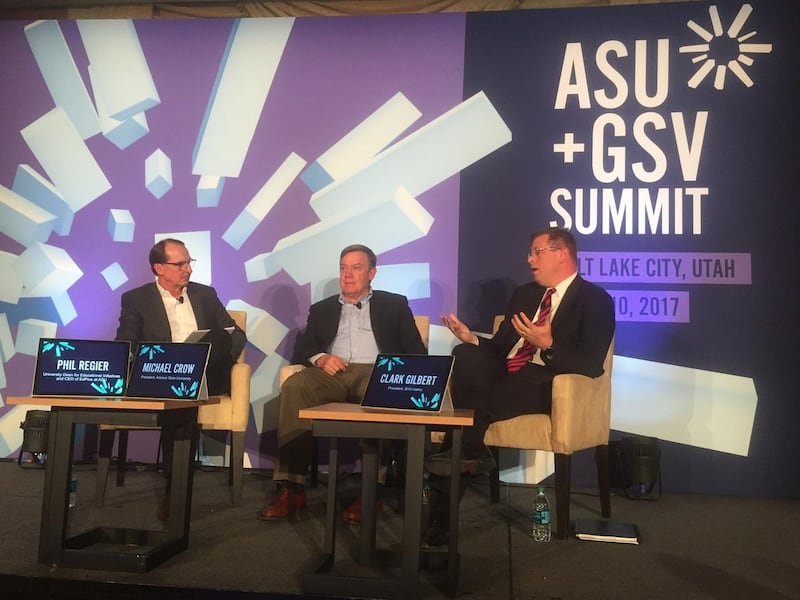SALT LAKE CITY — Two days after a report that 40 U.S. schools now charge $250,000 for a four-year college degree, two western university presidents described affordable new options designed for people intimidated by college courses or costs.
Many U.S. colleges and universities are too expensive, too traditional and sadly ineffective, BYU-Pathway Worldwide President Clark Gilbert and Arizona State President Michael Crow said Wednesday at a global education and technology summit in Salt Lake City.
American society must have more college graduates, Crow said. ASU's Global Freshman Academy and BYU-PW's Pathway program are breaking down college-going barriers, Crow said, offering college credits under major brands for less money. Hundreds of thousands of students are trying these new on-ramps to college education, most of them students who never thought they could or would seek higher education.
"BYU-Pathway was created for students who never thought they could go," Gilbert said.
"There's some kind of a strange virus inside many universities," Crow added. "They think the only way to do things is the way they've been done. Actually no, there's fantastic ways to enhance teaching and learning outcomes and make things happen.
ASU partnered with edX to launch the Global Freshman Academy two years ago. The academy offers seven online courses through the edX Massive Open Online Courses platform. Students don't pay until they pass a course. Tuition is $200 per credit hour, or $600 per class.
BYU-PW's Pathway program offers three online courses for $68 per credit hour ($204 per class) to U.S. students and three free religion courses at gathering sites. Tuition is lower for international students, as little as $8 in Ghana. Those who earn good grades can win admission to BYU-Idaho's online degree program and continue to pay the same tuition.
Both programs are intended to build student confidence and capacity, preparing them to become full, degree-seeking students, either online or on-campus.
Crow called it "a social failure" that fewer than half of college students graduate. Both programs intend to provide access to more students and improve graduation rates.
"Our overall objective is to begin to find a way to prove the point that any human can learn anything depending on the cirumstances," Crow said. "We have is a society right now that has built fixed institutions that some people are able to go to and some people are able to go through, but most people are not. We want a society capable of adapting to all of the changes our society is producing."
ASU has seen an 85 percent increase in its four-year graduation rate, Crow said.
Gilbert is creating stackable certificates and degrees at BYU-PW. A student can earn a certificate in a field of study, which becomes an off-ramp and an on-ramp. They can leave to find work and later return to build on that certificate toward a degree, or stay and become a degree-seeking student.
BYU-PW now has about 34,000 students in its Pathway and BYU-Idaho online courses, Gilbert said. ASU's Global Freshman Academy has more than 100,000 students, Crow said.
ASU has been named the nation's most innovative university two years in a row by U.S. News & World Report. It also is a partner in the Starbucks College Achievement Plan, which offers free tuition to Starbucks employees. Starbucks executive chairman Howard Schultz spoke at ASU commencement on Monday, when 330 company employees graduated.
ASU sponsors the annual education and technology summit with Global Silicon Valley. The panel discussion at the Grand America Hotel was one of dozens of presentations at the three-day summit, which included Andre Agassi (charter schools), Michael Lewis ("The Blind Side" and "Moneyball"), U.S. Education Secretary Betsy Devos and leaders of Coursera, Kipp and other education innovation companies.
One panel included new BYU-Idaho President Henry J. Eyring, who said universities need to engage students early, empower them and help them experience early success.
The four other members on the panel with Eyring said the biggest challenges facing higher education are cost, access and society's need for lifelong learners.
Eyring expressed admiration for Crow's efforts at ASU.
Gilbert, a former president and CEO of the Deseret News, said BYU-PW surveys showed that young adults and adults who hadn't finished or never started college worried about cost but chiefly felt they couldn't succeed.
"There's a whole population saying, 'We could never do this,'" Gilbert said.
In fact, many can.
"As we bring them through Pathway and they come and take our online courses," Gilbert said, "we prepare them the way Mike is trying to do with Freshman Academy, so they can be successful. Once they get to the online degree program, they perform at the exact same level as our students on campus.
"At the heart of this is realizing potential that was always there."


